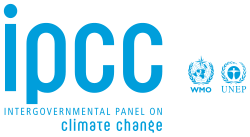
Back التقرير الخاص عن سيناريوهات الانبعاثات Arabic Informe Especial sobre Escenaris d'Emissions Catalan Informe especial sobre escenarios de emisiones Spanish Rapport spécial du GIEC sur les scénarios d'émissions French SRES Hungarian 温室効果ガス排出シナリオに関する特別報告書 Japanese Сценарији емисије гасова стаклене баште Serbian IPCC溫室氣體排放情景特別報告 Chinese
| Intergovernmental Panel on Climate Change |
|---|
 |
The Special Report on Emissions Scenarios (SRES) is a report by the Intergovernmental Panel on Climate Change (IPCC) that was published in 2000. The greenhouse gas emissions scenarios described in the Report have been used to make projections of possible future climate change. The SRES scenarios, as they are often called, were used in the IPCC Third Assessment Report (TAR), published in 2001, and in the IPCC Fourth Assessment Report (AR4), published in 2007. The SRES scenarios were designed to improve upon some aspects of the IS92 scenarios, which had been used in the earlier IPCC Second Assessment Report of 1995.[1] The SRES scenarios are "baseline" (or "reference") scenarios, which means that they do not take into account any current or future measures to limit greenhouse gas (GHG) emissions (e.g., the Kyoto Protocol to the United Nations Framework Convention on Climate Change).[2]
Emissions projections of the SRES scenarios are broadly comparable in range to the baseline emissions scenarios that have been developed by the scientific community.[3] The SRES scenarios, however, do not encompass the full range of possible futures: emissions may change less than the scenarios imply, or they could change more.[4]
SRES was superseded by Representative Concentration Pathways (RCPs) in the IPCC fifth assessment report in 2014.
There have been a number of comments on the SRES. It has been called "a substantial advance from prior scenarios".[5] At the same time, there have been criticisms of the SRES.[6] The most prominently publicized criticism of SRES focused on the fact that all but one of the participating models compared gross domestic product (GDP) across regions using market exchange rates (MER), instead of the more correct purchasing-power parity (PPP) approach.[7]
- ^ Section 1.5: Why New IPCC Emissions Scenarios?, in IPCC SRES 2000.
- ^ Morita, T.; et al., Special Report on Emissions Scenarios, 2.5.1.1 IPCC Emissions Scenarios and the SRES Process, in IPCC TAR WG3 2001
- ^
"Synthesis report", 3.1 Emissions scenarios
{{citation}}: Missing or empty|title=(help), in IPCC AR4 SYR 2007 - ^ Karl, TR; et al., eds. (2009), "Global climate change", Global Climate Change Impacts in the United States, New York, NY, USA: Cambridge University Press, p. 22, ISBN 978-0-521-14407-0
- ^ "Ch 3. Review of Major Climate-Change Scenario Exercises" (PDF), Sec 3.1.1. Significance and use, archived from the original (PDF) on 16 June 2013, in Parson & others 2007, p. 31
- ^ "Ch 3. Review of Major Climate-Change Scenario Exercises" (PDF), Sec 3.1.2. Criticisms and controversies, archived from the original (PDF) on 16 June 2013, in Parson & others 2007, pp. 35–38
- ^ "Ch 3. Review of Major Climate-Change Scenario Exercises" (PDF), Sec 3.1.2. Criticisms and controversies: Exchange rates: PPP versus MER, archived from the original (PDF) on 16 June 2013, in Parson & others 2007, p. 36
© MMXXIII Rich X Search. We shall prevail. All rights reserved. Rich X Search